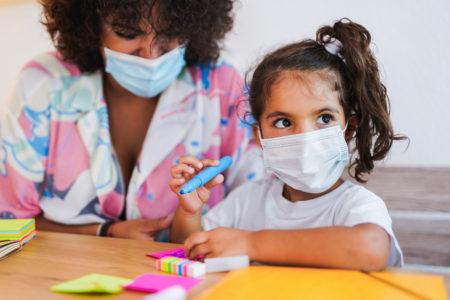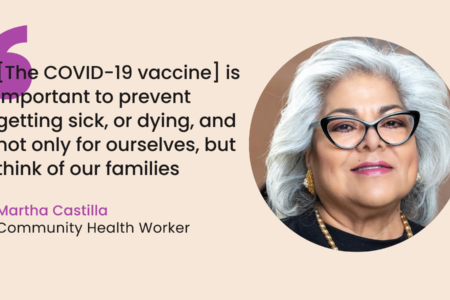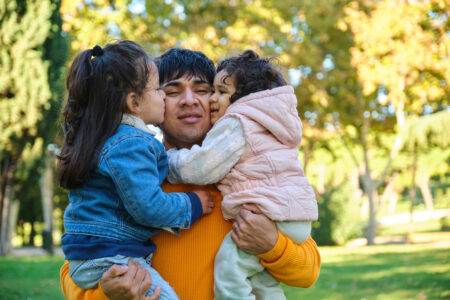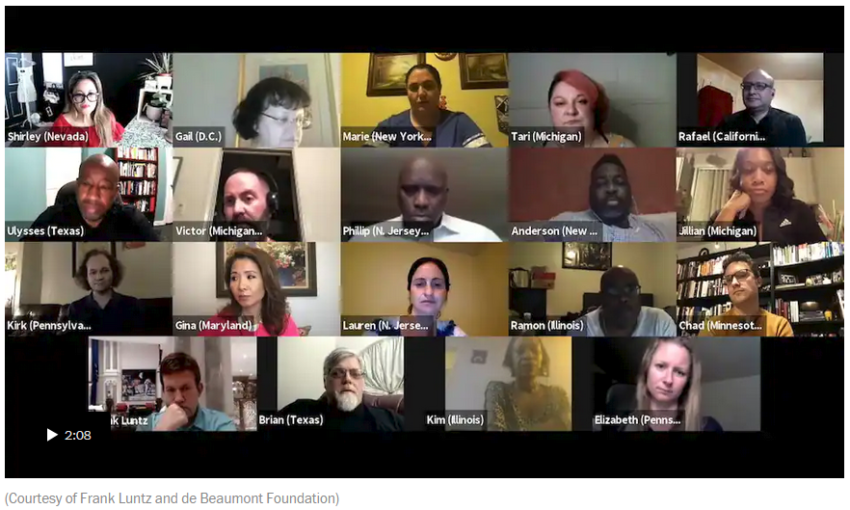
Share On Social!
People decide to get a COVID-19 vaccine for a variety of reasons – to protect their families, to protect their health, and to help society return to normal.
Some people are skeptical or hesitant to get the vaccine.
Vaccine skepticism among Latinos is caused by a variety of sources, such as historical trauma from healthcare mistreatment and misinformation about vaccines that is circulated on social media.
But many people are having a change of heart and deciding to get a vaccine.
As a part of their ongoing research on attitudes about COVID-19, the de Beaumont Foundation, along with pollster Frank Luntz, conducted focus groups to hear from people who had changed their minds about getting a COVID-19 vaccine.
Let’s hear why some of these people wanted a vaccine after initially being hesitant.
Marie from New York
“When I did the last focus group with you and you had the doctor from the CDC on, he explained it much better than Fauci or any of them did.”
Gail from DC
“I lost friends and family, and people getting the vaccine were surviving it.”
Shirley from Nevada
“When my friend got sick and she told us, ‘You don’t want this, we don’t wish this on you.’”
Ulysses from Texas
“I had three family members pass away, a neighbor pass away. A friend that works in the ICU on the COVID floor told me how bad it was.”
Phillip from New Jersey
“The precise moment I decided to get the vaccine was after talking to some highly-credible medical professionals that are family friends in New York and are first responders on the line every day, looking at what’s coming in and out and what they’re bagging and tagging.”
Anderson from New York
“On Friday March 19th I was listening to the Brian Lehrer Show and two folks who were long-haul symptom-holders of COVID-19 got on the show and said as soon as they got their shot, the symptoms faded away. That’s when I was convinced to go take my shot.”
Jillian from Michigan
“When it appeared as though I needed to have the shot to travel.”
Rafael from California
“For me, I suffer from depression and I miss having my group therapy. One of the reasons why I wanted to get it is if enough people get fully vaccinated and got the shots, I could go back to group therapy. Also, the idea of getting some sense of normalcy back to my life – being able to go to a Dodgers game, being able to travel. You need to have the vaccination to do it. And for me, beating my depression was more important than my fear of the vaccine.”
Elizabeth from Pennsylvania
“It was important as time went on that I learned that there weren’t any major effects that people were having from these vaccines. But honestly rather than there being a moment that I learned something, it was more like as time went on, the balance of things that I wanted and that I wanted for my daughter and I want to travel and I want to get back to normalcy. Those things started to tip the scale. But my fears about getting vaccinated are honestly still there and I have both doses. I read articles and I think ‘Oh goodness, is there going to be something they discover?’ It’s still here. I don’t feel 100% but I just feel like in my decision making, the pros and cons shifted.”
Lauren from New Jersey
“I came around. People are going to want to be able to do things that they’re not able to do without the vaccine. Now even colleges are mandating it, so I think eventually more and more places are going to mandate that you need to have it.”
What are Some Common Themes from the Focus Group?
Many in the focus groups had similar concerns about the vaccines. They echoed similar reasons for choosing to get vaccinated.
Here are common themes heard from the focus group, according to the de Beaumont Foundation:
- Their perceived risk of getting COVID-19 outweighed their concerns about the safety of the vaccines.
- They were motivated by things they want to be able to do, like travel, go to sporting events, and safely see friends and family.
- The most influential source of information about COVID-19 vaccines was a doctor, pharmacist, or other medical professional who they knew and trusted.
- They became more comfortable after seeing people they know get vaccinated without major complications. (This was much more important to them than seeing politicians, athletes, or other celebrities get the vaccine.)
- When asked about their thoughts about people who still say they won’t get vaccinated, many said they respect that position because everyone has the right to make their own decision, while others said those people are uninformed, misinformed, and “a little selfish.”
Find COVID-19 vaccine locations near you in English or Spanish!
Concerns for Latinos about Vaccines
Communities of color tend to be more skeptical of the COVID-19 vaccines. This can be due to historical trauma and/or mistrust of government.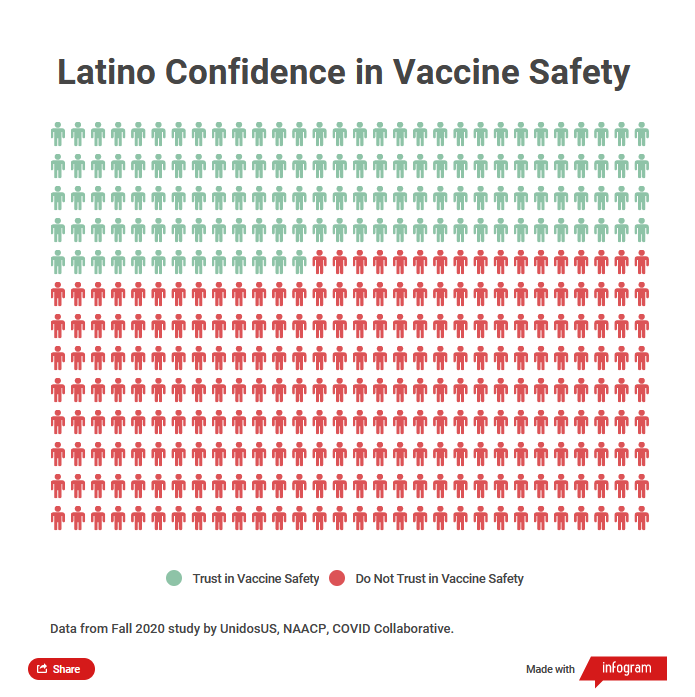
A Fall 2020 study by the COVID Collaborative, a nonprofit coalition made up of Langer Research Associates, Unidos US, and the NAACP, measured hesitancy about the safety of a COVID-19 vaccine in Black and Latino communities before the COVID-19 vaccines were authorized. Their findings showed:
- 66% of Latinos and 86% of Black people do not believe the vaccine will be safe
- 60% of Latinos and 82% of Black people do not trust that the vaccine will be effective
- The majority of Latino (66%) and Black people (72%) are likely to trust their community leaders and health care providers when it comes to a vaccine
The top concerns for Latinos regarding COVID-19 vaccines are safety, cost, diversity in the clinical trials, and availability for undocumented people, according to a toolkit by the Ad Council and COVID Collaborative.
“The COVID-19 vaccines are available for the undocumented community. Health providers should not discriminate against undocumented individuals from getting the COVID-19 vaccines. Some personal information might be request, and the personal information requested will vary by site. Although fear is a reality for the undocumented community when giving out personal information, it is important to seek information from community allies,” according to the toolkit.
Top Ways to Address Latino Vaccine Hesitancy
We can build vaccine confidence for Latino communities through these methods:
1. Use Clear and Accessible Messaging
We can build trust by using clear and accessible messaging, such as simple language that avoids difficult terminology and can help with understanding.
2. Be Credible and Transparent
It’s important that we provide credible and transparent information about the vaccine and not make any claims that aren’t verified by medical experts.
3. Uplift Local Leaders in Communities of Color
One of the most important ways to build vaccine confidence is through uplifting local leaders in communities of color, like the Latino community. Having ambassadors to address vaccine questions and concerns helps calm fears that the vaccines weren’t developed with these vulnerable populations in mind.
4. Build Cultural Humility
Cultural humility means being aware of how history and culture intersect to affect people’s beliefs, especially when it comes to historical trauma and wrongdoing, according to the Hogg Foundation for Mental Health. Building vaccine confidence will require knowledge of the intersection of history and culture.
5. Be Respectful and Empathetic
It’s important to approach hesitant communities with respect and empathy. Dismissing people’s concerns, even if rooted in misinformation or conspiracy, may invalidate or upset people who are just looking for answers.
Read more about these ways here.
Find COVID-19 vaccine locations near you in English or Spanish!
By The Numbers
142
Percent
Expected rise in Latino cancer cases in coming years

